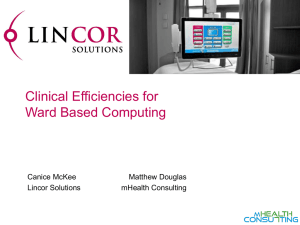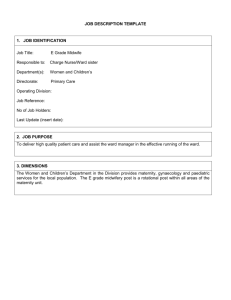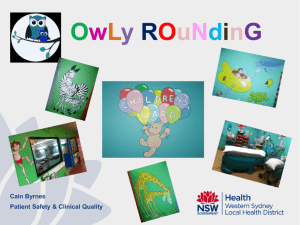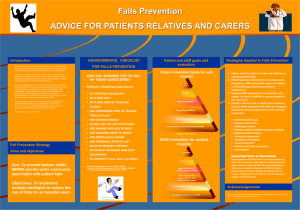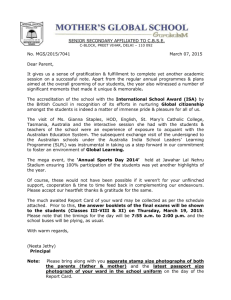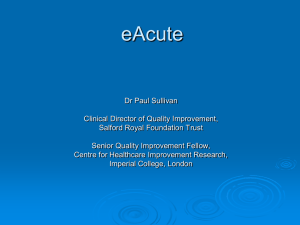Dear Ms Pickerill, Further to our telephone conversation I write
advertisement
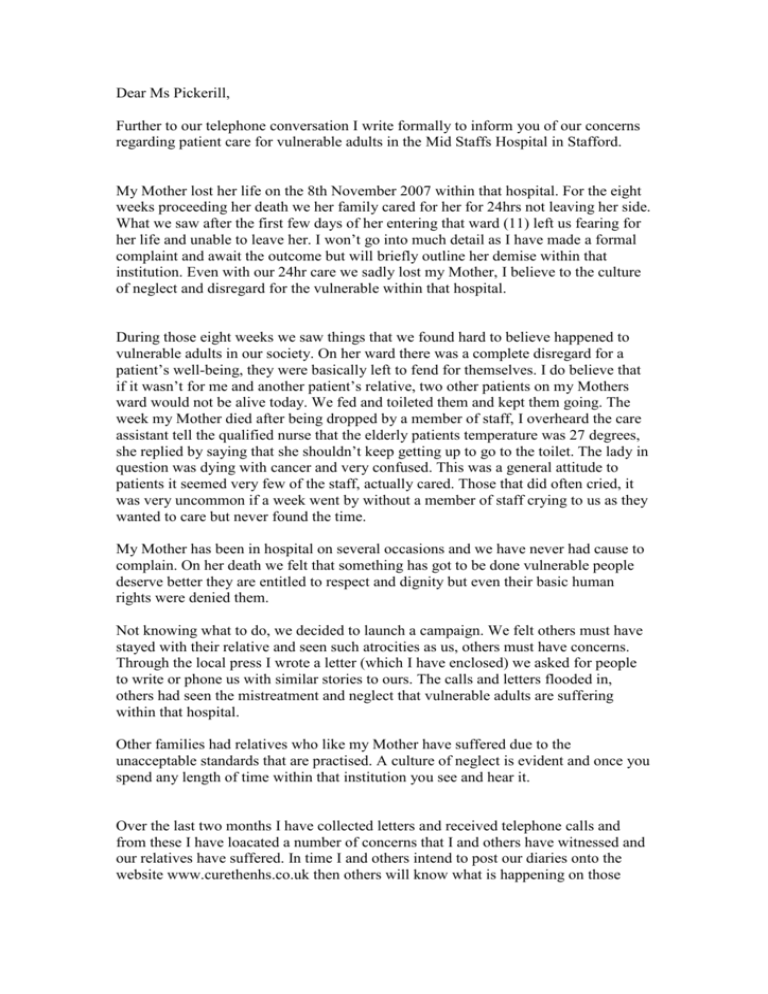
Dear Ms Pickerill, Further to our telephone conversation I write formally to inform you of our concerns regarding patient care for vulnerable adults in the Mid Staffs Hospital in Stafford. My Mother lost her life on the 8th November 2007 within that hospital. For the eight weeks proceeding her death we her family cared for her for 24hrs not leaving her side. What we saw after the first few days of her entering that ward (11) left us fearing for her life and unable to leave her. I won’t go into much detail as I have made a formal complaint and await the outcome but will briefly outline her demise within that institution. Even with our 24hr care we sadly lost my Mother, I believe to the culture of neglect and disregard for the vulnerable within that hospital. During those eight weeks we saw things that we found hard to believe happened to vulnerable adults in our society. On her ward there was a complete disregard for a patient’s well-being, they were basically left to fend for themselves. I do believe that if it wasn’t for me and another patient’s relative, two other patients on my Mothers ward would not be alive today. We fed and toileted them and kept them going. The week my Mother died after being dropped by a member of staff, I overheard the care assistant tell the qualified nurse that the elderly patients temperature was 27 degrees, she replied by saying that she shouldn’t keep getting up to go to the toilet. The lady in question was dying with cancer and very confused. This was a general attitude to patients it seemed very few of the staff, actually cared. Those that did often cried, it was very uncommon if a week went by without a member of staff crying to us as they wanted to care but never found the time. My Mother has been in hospital on several occasions and we have never had cause to complain. On her death we felt that something has got to be done vulnerable people deserve better they are entitled to respect and dignity but even their basic human rights were denied them. Not knowing what to do, we decided to launch a campaign. We felt others must have stayed with their relative and seen such atrocities as us, others must have concerns. Through the local press I wrote a letter (which I have enclosed) we asked for people to write or phone us with similar stories to ours. The calls and letters flooded in, others had seen the mistreatment and neglect that vulnerable adults are suffering within that hospital. Other families had relatives who like my Mother have suffered due to the unacceptable standards that are practised. A culture of neglect is evident and once you spend any length of time within that institution you see and hear it. Over the last two months I have collected letters and received telephone calls and from these I have loacated a number of concerns that I and others have witnessed and our relatives have suffered. In time I and others intend to post our diaries onto the website www.curethenhs.co.uk then others will know what is happening on those wards. I have not included anything that I alone saw but only what I and others witnessed. Since the launch of our campaign around 40 people have contacted me and people are still contacting us. We have formed a group and have held two meeting to discuss our concerns and to plan a way forward to alter the neglect within that hospital. We do not intend to let this abuse continue and we are determined to stop our vulnerable members of Staffordshire suffering like our relatives did. What we have found is that the complaints procedure has been ineffective. Since I posted my reply to my initial complaint from the hospital on the web site families have contacted me as their replies are so similar. It is sad to say that the hospital resort to cutting and pasting their responses or that is what it seems. Similar too is their explanation of events, there is always a sister who denies what the family is saying and gives a different account. In all the cases we have compared, a sister hasn’t even been present at the time of the incident in question, each response says she was. Important records are either lost or altered to support the hospital’s version of events. Familiar to is their conclusion they apologise, for the shortfalls in the level of care our relative received, it was a busy period. The essence of care benchmarking will ensure it doesn’t happen again. They have been peddling this excuse for years and the neglect continues. It seems that there is something suspicious happening or has happened to us all, the truth hasn’t been told. We have also compared responses from the Health Commission and they too have similarities. Action plans have been implemented but it appears never monitored and sadly not adhered to. One family who lost their Mother through neglect, were assured that an action plan would be implemented on ward 11 to stop the neglect their Mother had suffered some months earlier. The plan was supposedly implemented two weeks before my Mothers admission. From my letter in the newspaper the family were alerted, the neglect continues for vulnerable patients nothing has changed. From all the concerns I have received I will try to highlight the points that keep reappearing. One thing that is evident is once you spend any length of time in that hospital you see and hear things that disturb you. Our concerns are in no particular order and apply to vulnerable patients regardless of age. I began to believe that the neglect is isolated to wards 10, 11 and 12, but through the contact I have had with relatives, patients are neglected on any ward if they are vulnerable and need more care and attention from the nursing team. It just seems there isn’t enough staff on duty at any one time and those that are on duty are very often in need of training and lack the ability to care for others. Those we did meet that wanted to care, were mostly new staff. 1. Patients not fed or given fluids- meal trays left on tables where patients are unable to reach. 2. No assistance with feeding- packets hard to open 3. If the menu the previous day is not completed patients are left without food the following day-confused patients are unaware they have to fill in a menu sheet. 4. Patients left lying down when meal tray is brought to them – they are unable to sit themselves up 5. Lack of concern by nursing staff when families have told them of their concerns over lack of nourishment 6. No monitoring of nourishment- no accurate monitoring of input/output intake 7. Patients weight not monitored – even when concerns have been raised 8. Haphazard monitoring of bowels/urine 9. Buzzers left out of reach for patients to use 10. A long wait for the buzzer to be answered even longer at night 11. Staff are unable to assess the urgency of the call.- often respond to a patient who has rang later and another patient has been waiting longer. 12. Patients having to wet themselves or to soil their beds due to waiting so long for a response 13. Patients left in soiled wet beds- often overnight. 14. Patients not helped to the toilet – but told they must use the bed pan (staff too busy) 15. Over use of catheters- no explanation of why they are being used 16. Catheters not emptied often enough and left to overfill 17. Patients not helped to wash or those needing total care not washed at all. 18. When the staff have time to wash patients they are always put in hospital gowns which exposes them at the back, despite them asking to be put into their own nightwear 19. Dentures and hearing aids not given – dentures often left in mouths for days 20. Frail patients left sitting in chairs from very early in the morning (7.30) until late at night when the night staff have time to put them into bed. 21. Confused patients allowed to roam the wards exposed wandering into male/female wards and staff ignoring them 22. Staff unable to manage confused patients 23. Confused patients fighting and arguing with other patients due to boredom 24. Staff shouting and pushing confused patients- ordering them back to their bed 25. Patients hitting out at nursing staff who have shouted at them. 26. Overuse of medication to control anger in a confused patient who the staff have upset 27. Patients calling out to staff and being ignored 28. Staff shouting, squealing and laughing through-out the night disturbing patients 29. Patients left without pain relief as two trained staff are rarely available to administer controlled drugs 30. Medication not given on time 31. Medication not monitored for side affects 32. All medication stopped on admission and often not restarted - despite patients being on the medication for years – no monitoring 33. Lack of general pain relief 34. Drugs required often not on the drug trolley – patients often told nurse will return with the required medications but often not given as nurse forgets to return as she is too busy 35. Wound dressings not changed or even checked by staff 36. Immobile patients not turned for pressure relief 37. Over use of health carers – often new to the ward and not told what they need to do - No guidance given by more senior staff 38. Observation’s not taken on a regular basis- machine often broken – or health carer hasn’t been trained to take, read or respond to the results. 39. Staff not washing hands when it is required 40. Lack of hand wash and towels to wash hands 41. Lack of cleaning of equipment (tables, chairs,beds) 42. Isolation rooms often not cleaned after a patient has left (staff too busy) and another patients admitted 43. Lack of information around infection – not told or tested for MRSA, C Diff 44. Patients discharged without tests for the above but them readmitted a few days later – tested with a positive result but recorded as contracted at home 45. No compliance with manual handling – staff unaware of correct handling procedures 46. Lack of risk assessments 47. Patients often lifted by staff / patients dragged up the bed and left in pain 48. Patients put and left on commodes for long periods –often fall trying to get themselves back to bed 49. Staff roughly handling patients 50. Patients found on the floor not checked for injury by staff. 51. Staff often rude to patients and families 52. Lack of consultation with family/carers 53. Family rarely told of diagnosis or medical opinions, test results 54. lack of communication between doctors and nursing staff 55. Lack of communication between confused patient’s, doctor’s and nursing staff 56. All charts collected and filled in by staff at night – oblivious to what has happened during the day- often incorrect 57. Staff often in tears –telling relatives to complain on their behalf 58. Long periods where relatives search for staff to assist them with their relative. 59. Patients notes left lying around – often going missing when required 60. Staff lack skills to help relatives to deal with death- very little comfort from staff 61. Lack of training for staff which covers- basic needs, confused patients, handling aggression, risk assessment, manual handling, how to take and respond to observations, medication, basic communication, dealing with death, wound dressings, nutrition, discharge planning , working in partnership 62. Complaints not being dealt with – issues overlooked 63. Notes/records distorted and altered 64. Discouraged from making official complaint as told to discuss with the ward staff 65. PALS found to be ineffective 66. PPI found to be inaffective I believe that from the information I have seen and the actual things I have witnessed I have found the hospital is not adhering to the core standards recommended by the Health Commission. We urge you to do something to stop the neglect within that hospital. I believe that the problem is because they have been left too long to their own devises. They have been allowed to practice badly as no-one is monitoring them or managing them. During my stay on ward 11 it was often in utter chaos with patients wandering around undressed, others shouting for the staff and some acting aggressively. The day started around 7 am with the health carer switching on the lights and dragging open the curtains it would still be dark outside. The day team was made up of around 50% of staff who wanted to care. The other 50% were made up of older more established staff. My Mum called them the rough ones. You could hear them dragging the weak out of their beds saying nothing if working alone. If working with another carer they talked over the patient. Once they had dragged them out the bed they left them sitting in a chair uncovered until breakfast at 9am. Some patients were then left in those chairs until 11pm that night. There seemed no management/supervision on the ward. Staff when you did see them were often hurried and trained staff were rarely seen beyond the drugs round. This was very often a haphazard event sometimes arriving 2 to 3 hrs later than expected. Pain relief of any sort was difficult to obtain. There seemed no coordination and you could easily wait a day for 2 paracetamols. Controlled drugs were very often impossible to obtain as their administration required 2 trained staff. Technically this shouldn’t have been a problem as ward 11 shared staff with ward 12 but it was. One day we listened for over 4 hrs whilst a patient opposite my Mother cried out for pain relief. I and another relative informed the nurse’s station and she was seen by 5 health care assistants who came and turned her buzzer off, telling her a nurse would come when she could. Listening to that patient crying out in pain for over four hours is something that continues to haunt me. The ward round was another event that happened whenever, some day’s a round never took place we were never given an explanation. Sometimes a nurse was present but most days not. A nurse manager would often be present but she seemed to know even less than the doctor’s knew about the patient. They seemed to run a series of expensive tests often not telling the patients or their relatives what for. But ignoring the very basic problems a person suffers. They always seemed to focus on the much bigger diagnosis without considering the common ailments of vulnerable people, who hadn’t eaten or drank for days. They lacked common sense and failed to consider basic symptoms. For instance my Mother clearly had a chest infection, I had cared for her for years and knew the symptoms but it took me four days to convince them. After several ECG and a series of doctors opinions I eventually, resorted to saving a bowl of green sputum overnight to show them. My Mother was started on antibiotics that day. But if I hadn’t been there to speak for her I suspect she would never have got a diagnosis. They seemed to lack any common sense; they would stop previous drugs without monitoring if they needed to be reintroduced. My Mother had been taking warfarin for years, due to a history of strokes. It wasn’t until she was due to be discharged and I asked if she would be restarted that they even remembered she had been on the drug. Her first dose was 26mg followed by 16mg she normally took 1 to 2 mg a day. Others weren’t so lucky and as you can see from the letters they died due to not having their previous medication. Night time on the ward, some nights, I can only describe as hell. Some staff barked and pushed patients back into bed. Others the carers, raced around and tried to meet needs. As they tried to answer a buzzer and settle someone another would sound and another. Buzzers constantly went off and IV drips sounded all night. Patients rang for over an hour, in desperation you could hear them struggling to get up. Some failed and eventually wet themselves. The sound of men crying and sobbing because they had wet themselves, to this day haunts me. Why didn’t I do something, why didn’t I stick my neck out to help them? I didn’t because I didn’t want to upset the nurses, I knew they could ask me to leave at any time. I believe that it is only through my Mothers family providing her care that she didn’t contract a bug, super or otherwise and lived as long as she did. Despite us providing 24hr care we sadly lost my Mother she was due to come home on the Monday. But she was dropped and a drug error then finished her off. My Mother was a fighter but she had suffered enough within that institution she was forced to give up. Other vulnerable patients give up too, they are left with no will to fight in such an uncaring hostile environment. We have seen our relatives drained of any speck of dignity they once had. Proud, proud people who died needlessly, destroyed, by the very people who should be there to help them. We have now, around 40 people from the Staffordshire area who have made contact. We have just had our second meeting and I am receiving more and more letters on a daily basis. At the last meeting there were several of us who are unable to sleep at night knowing how our relatives suffered within that hell hole. I am hoping you are able to help us stop this suffering before someone else’s parent dies through neglect in that uncaring environment. My Mother and other’s have lost their battle to live we do not intend to lose our battle to improve patient care for vulnerable groups. I await your response, Yours Sincerely Julie Bailey

